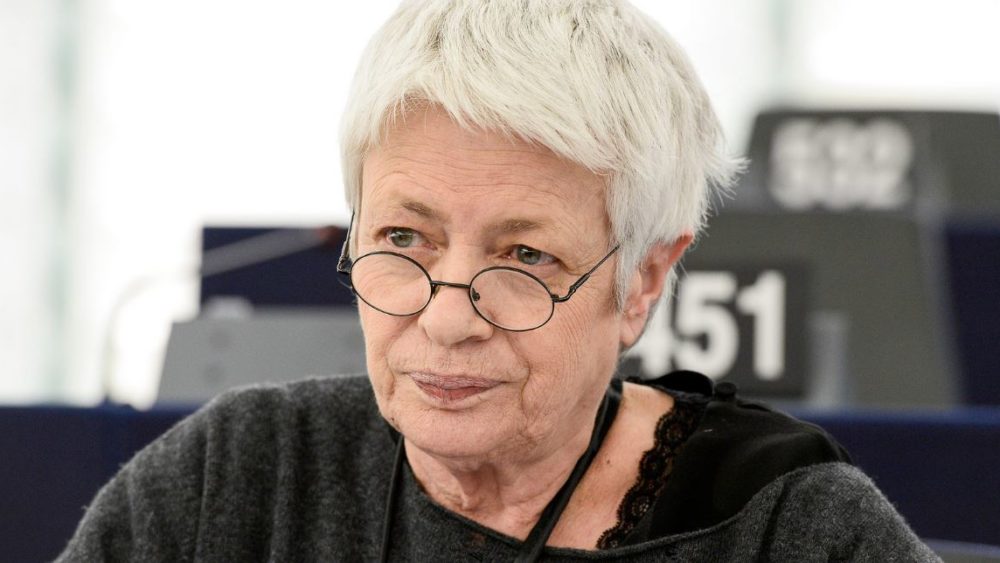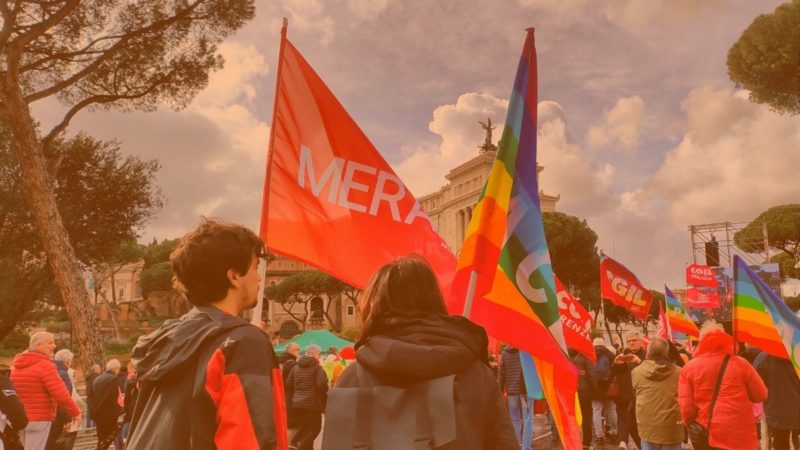Barbara Spinelli is an author, journalist and MEP for the GUE/NGL group in the European Parliament, as well as a member of DiEM25. Lorenzo Marsili is one of the initiators of DIEM25 and the cofounder of European Alternatives.
Lorenzo Marsili: In your response to Verhofstadt, you have argued that before considering any constitutional change of the European institutions we need to invest in policies capable of restoring citizens’ trust towards the European project. Failing that, any project of Treaty reform will likely be hindered by the profound mistrust towards the EU. This two-steps approach is also at the core of the manifesto of DIEM25 – stabilisation of the Eurozone first, and then constitutional reform. Can you tell us what kind of reforms you think are necessary to recover trust towards the European project?
Barbara Spinelli: If we really care to defend the European project, it is completely unreasonable to start institutional revisions before having radically changed the policies that brought us to this multi-faced crisis, so similar to the one of the Thirties, in the first place. And the root-cause is not only in the EU’s economic-financial make-up but also in its democratic failure, the disintegration of societies, and a loss of orientation and hope experienced collectively by European citizens. The mainstream version of institutional federalism is substantially dead but still clings to the belief that modifying the balance of power between the different bodies of the Union will be enough to solve all problems. But this revolution has already taken place, and it is still underway, and we know that it has produced what Jürgen Habermas calls “post democratic executive federalism”. The debacle and decomposition of the Union are so vast that the order of priorities must change: Politics is not losing importance, but policy is the priority today. European politics will hopefully be of a federal nature, but such goal must be the consequence and the formalisation of a fundamental reconsideration of the policies adopted since today: in the economic and financial field, in the management of the too scarce own resources of the Union, in the effective, and not only claimed, democratisation and transparency of all common institutions.
This is precisely what is being refused by the powers that be in the Union,, and such refusal clearly appears in the two resolutions on which the European Parliament is working: both on the Verhofstadt report on the transformation of the Treaties and the Bresso-Brok report analysing what can be done without Treaty changes. The basic idea of both reports is evident: the various economic agreements stipulated since the beginning of the great crisis of 2007-2008 must be incorporated in the Treaties. The aim is apparently democratic: as inter-governmental agreements, the European Parliament has no co-decision power over them and is hence marginalised. The tendency of the Member States is to increase the weight and the number of such agreements: it is a privileged path for governments that are less and less keen on bearing the supervision of the national and European Parliaments. We have tested this approach with the Fiscal compact and also with the recent EU-Turkey agreement, renamed “statement” in order to avoid being subject, like any international treaty, to the vote of the Parliaments – both European and national ones.
We have arrived at a tipping point in the EU where the obsessive insistence on the institutional method – be it intergovernmental or Community-based – is not only insufficient. It is a technical masking of a political substance that does not change, of a European project that does not want to become neither political nor democratic, but deliberately tends to be a programme of oligarchic domination. To take an example, the Fiscal Compact does not improve or become socially just, if we simply incorporate it in the Treaties and consider it as part of the Community method instead of an intergovernmental or international agreement. We will still be left with nothing but failing austerity policies.
In other words, we are facing a clear strategy: the aim is not advancing towards a normal democratic government, but towards a so-called administrative “governance” that serves to protect the interests of small power cliques and privileged groups, insulating them certainly not from the markets, but from the uncertainties of universal suffrage and of constitutional democracy.
Lorenzo: Why should we trust a shift of gear to be any more likely today than over eight years of avoidable crises? We still have to hear convincing arguments as to how any ambitious and disruptive proposal can survive the haggling between 27 members states, all of which have national vetoes, several of which are ruled by openly nationalist and xenophobic governments, and some of which have deeply ingrained economic obsessions. We have seen it all before: ambitious proposals for investment reduced to the risible Juncker plan; a migration agreement reduced to a few hundred relocations from Greece and a bribe to Turkey’s Erdogan. And then again an ineffective Youth Guarantee and a dysfunctional Banking Union. Why should it be different this time?
Clearly the current Treaties are not enough. And definitely we need an authentic Constitution: not signed but the governments of the Member States but starting, as the American one, with the words: “We, the people…” . However, policies must change beforehand. How can this be done with the current institutions? I am convinced that a democratisation of their mechanisms and their decision-making could be a first step, albeit certainly not the only one. If the heads of government, the ministers, the commissioners, the members of the Parliament felt themselves under permanent scrutiny from well informed citizens (and hence “enlightened”, according to Kant: treated as adults), they would have quite some difficulties behaving as an oligarchy. It would not be possible for the Eurogroup to take a decision against the opinion of a Member State, as happened in the meeting of 27 June 2015 when the former Finance Minister Yanis Varoufakis demanded for the Greek objections to be formalised , and the legal services of the Union replied that it would not have been possible, in light of the fact that the “Eurogroup is not mentioned in the EU Treaties and operates as an informal grouping. As such, it is not subject to any written rule”.
Concrete transformation plans could come from the citizens and not only from the European Parliament. Transparency is important but is not everything, the citizens ask for more. They demand first and foremost a true European New Deal, which would create jobs and fight against poverty and growing inequality. The proposals are many: from those illustrated by Yanis Varoufakis, to those which came out from the Citizens Initiative “New Deal 4 Europe” (tax on financial transactions and carbon tax for investments in ecologically sustainable growth). Only by starting a New Deal we will be able to face the refugee crisis, building an economy based on solidarity, and avoiding falling into xenophobia, racism, and widespread violence.
Lorenzo: Agreed. But what are the subjects capable of filling the gap? We hear over and over a string of empty exhortations to build “another Europe”, but few believe in this rhetoric any longer. National parties don’t seem interested or able to see beyond the failed euro-reformist rhetoric (Francois Hollande was the first to promise a transformation of austerity policies – we are now left with the Loi Travail and the State of Emergency). Transnational parties – a series of acronyms without a true strategy or common campaign – have proven to be unfit to lead a democratic revolution. Is it perhaps time to imagine a true European party? Or maybe, even in light of the next European elections, to imagine a “democratic front” to bring different political and social forces together with a simple but firm reform programme of the Union? Could this include disobeying EU rules? Or how can we overcome empty rhetoric and put up a strategy of rupture with a status quo that you rightly define, with the words of Habermas, “post democratic executive federalism”?
Barbara: In reality, the subjects are there, we just need a better eyesight, and the language, the curiosity and the capacity to listen and be able tell them, like the old prophets did: Here we are. Not only to represent you, but also to understand and spread what you think, what you fear, what you demand or what has deceived you. Class war has not ended, even if the social question naturally presents itself under new clothes today. Not only the representation of these subjects is missing, not only do we have to face a vast attack against all intermediary bodies of society (beginning from the trade unions), but there is something more: the division today is not between who is “up” and who is “down” , but between who is “in” and who is “out”. The best definition that translates this being “out” is the one used by Saskia Sassen: it’s no longer a question of marginalisation or exploitation only, but of brutal and active expulsion. We are faced with old impoverished classes, with a new downgraded middle class full of fears, and with new classes that are even deprived of a name. And all of them tell us, as the Commendatore in Don Giovanni: “Ah tempo più non v’è” – “Your time is up”. We have to speak with these groups, so as not to fall ourselves into the denial of reality we are stigmatising.
Let’s not hide to ourselves that Syriza’s failure has inflicted powerful and far-reaching wounds, to the point that millions of citizens do not believe in possible alternatives anymore, and not only in Greece. They rightly think that the universal suffrage has been disrespected. We have to admit that democracy as a whole is left with broken bones. I am convinced of the influence of the Greek events over Brexit, a vote that has been claimed by a large number of people who said to themselves, often without considering the effective powers of Great Britain: what Athens has not been able to reach (the restoration of popular sovereignty), we, as a stronger and older State, have the power and strategic weight to achieve it. The capitulation of the Syriza government after the referendum of the 5th of July 2015 has to be recognised and represented as something similar to the primal scene which unsettles the child who was used to imagine his parents as gender-neutral, as “innocents”. Once the primal scene has been recognised, you can decide not to consider it, or pretend not having seen what you have seen, but the effect remains and it will be devastating if you don’t get out of it with some precautions and a new knowledge.
Such denial of reality is also one of our ruinous deficiencies. The Greek traumatic breaking point is still being hidden, or worst, is totally repressed or embellished even by great part of the radical left demanding “another Europe”. What we must restore is the relationship with reality and the truths that it tells us: the reality of an humiliation which Syriza doesn’t recognise, the reality of Trump’s success, the reality of Brexit, the reality of a Polish society that has had enough with the pseudo liberal lies of the post-communist élite and has given the majority to Jaroslav Kaczynski and to the PiS. The reality doesn’t disappear just because we call it “populist”. We have to start again from here, from this irruption of the reality principle, if we want to avoid the remake of the 1930s.
You ask me what can be concretely done in order to build a European transnational party, a sort of “popular front” that could stand in the next European elections with a programme of rupture with the powers that be of the Union. First of all we have to clarify a few concepts by asking ourselves some fundamental questions: what does it exactly mean to take back our sovereignty; how to save the distinction between popular sovereignty and national sovereignty; what is the cost of non-Europe; what are the demands of the impoverished and expelled classes; which is the meaning of the rupture strategy you are mentioning, and are there actually States and local administrations capable of disobeying the absurd ruled imposed by European and national executives who pretend to lead us.
Then we have to respond to the fears of the people – voluntarily provoked by the hegemonic powers, but fears nevertheless. Let’s take the migration and refugee question as an example: we have to condemn the indecency of walls and collective expulsions predisposed by the Member States with the complicity of the European Commission, and denounce their will to inflate the extreme right with the purpose of using it as a scarecrow. But at the same time we must remove the sentiment of fear in our fellow citizens because this sentiment too is a “reality”. It is of utmost importance to launch a widespread campaign against those fears, understanding their mechanism, helping to overcome them with rational arguments and proposals, and explaining that the “monster” in front of us is not the refugee question but the question of a Europe that no longer works. No government, no European institution, no mainstream newspaper has had until now the courage to remind the citizens that the refugees and migrants arrived in the Union’s countries this year represent only 0.2 percent of the EU’s population.
We have to break with the rules that ruin the Union, but we must also reassure the citizens: it’s a matter of urgency. It is useless to say that we will “mobilise the masses” against racisms and neofascisms, because the masses we are talking about don’t exist anymore, and a large part of them has anyway ceased to vote.
Lorenzo: This much we have learnt over the last years: it is EU decision-making itself that is broken and unable to result in coherent and ambitious policies. The timidity and corruption of our establishment, coupled with the disastrous inefficiency of our institutional structures, make for a toxic combination. We must, at some point, talk about reforming the European institutional structure. But this is a tortuous path. The so called “ Schäuble plan”, namely the integration of the Eurozone through the appointment of a European finance minister essentially tasked with enforcing the austerity rule-book, seems a step in the wrong direction. But also a traditional European Convention – a grim show of bureaucrats and national diplomacies – risks resulting in a hole in the water. Many speak about the need for a constituent Assembly directly elected by European citizens. Others, such as Piketty, advocate the idea of a Parliament of the Eurozone. What is the most promising path to trigger a reform of the government of the European Union?
I agree with the idea of a Constituent Assembly, but without leaving the project in the hands of an intergovernmental process. It already happened once, in 1984, when a constitutional project put forward by the European Parliament has been devitalised and deformed in this way.
The Schäuble plan you are talking about goes in a completely different direction. It does not even limit itself to proclaiming a European finance minister. Since Great Britain voted for Brexit, Schäuble is recommending the simple return to an intergovernmental Europe, to the old “balance of power” which caused two world wars in the previous century. He takes distance from any federal vision in order to save and protect the austerity policies imposed during these years. The very word “vision” is abhorred. The key expression today, according to Habermas, is the following: “No more vision, everything by now is just a question of “Lösungskompetenz”, of solution skills” . The German establishment’s and Schäuble’s goal is to consolidate the definitive victory of ordoliberalism.
According to the ordoliberal doctrine, born in between the two wars in the School of Freiburg, “keeping the national house in order” is the necessary and sufficient condition for the achievement of an international order. Every State must first reorder its accounts, and only then common economic resources, cooperation and New Deals may come. In the international headquarters nothing must be decided in common; at most, it is a place of information where the strongest impose adjustments on the weakest. Ultimately, the essence of this doctrine is simply and purely the return to nationalism. A nationalism that today also risks contaminating the minds of left-wing anti-austerity forces. To them, I would feel like telling: be careful, in the battles for an “exit” from the euro, or the Union, you risk finding at your side not those who want to shield Europe from the global markets, but the barely masked nationalism of Wolfgang Schäuble.
Volete essere informati delle azioni di DiEM25? Registratevi qui!




